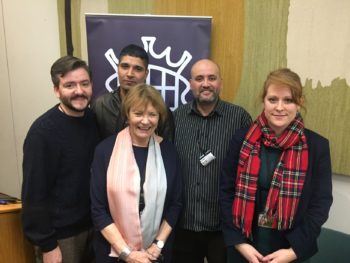
Non-religious asylum seekers face torture or death if they are denied asylum in the UK and forced to return to their home countries, an event in Parliament has heard.
The All Party Parliamentary Humanist Group (to which Humanists UK provides the secretariat) yesterday hosted ‘Protecting non-religious people’s rights to asylum in the UK’.
Chaired by APPHG co-chair Baroness Bakewell and held to coincide with Human Rights Day on 10 December, the event opened with International Humanist and Ethical Union (IHEU) President and Humanists UK Chief Executive Andrew Copson speaking about the worsening plight of human rights for non-religious people around the world.
IHEU’s 2018 Freedom of Thought Report released recently shows 13 countries where blasphemy or apostasy is punishable by death.
Freedom of religion or belief, including for humanists, is often poorly upheld in the asylum process in the UK, despite the right being enshrined in national and international law.
To combat this, Humanists UK has been working with the Home Office to introduce mandatory training on freedom of religion or belief (including humanism) to asylum seekers assessors. The training is expected to be delivered from early 2019.
The event also heard troubling stories from two asylum seekers who have been denied asylum in the UK.
Hamza bin Walayat is a humanist Pakistani asylum seeker who was denied asylum because he couldn’t identify Plato and Aristotle as humanists (despite the fact that neither were humanists). Humanists UK has supported his case by organising a petition to 10 Downing Street and will be supporting his upcoming appeal.
In Pakistan, the most basic rights of humanists and non-religious people are restricted daily and non-religious people face jail, mob brutality, murder, torture or the death penalty.
Mohamed Aly, a humanist Egyptian who has also been denied asylum, spoke of his fear of returning to Egypt, where blasphemy and apostasy is a criminal offence. Egypt also looks set to pass a new law criminalising not believing in god.
Humanists UK Chief Executive Andrew Copson said: ‘To have the freedom to talk about one’s experience and beliefs as a non-religious person should be an integral part of our human experience but in countries like Pakistan, Egypt, and Saudi Arabia these very basic rights could result in jail, torture or death.
‘As we have heard today, the lives of asylum seekers are at risk if they are forced to return to their country where it is a crime to be a humanist or a non-religious person. We hope through the upcoming training programme that the Home Office will uphold more people’s rights to freedom of religion or belief, which is enshrined in national and international law.’
At the meeting, Katharine Thane, from the All Party Parliamentary Group for International Freedom of Religion or Belief, talked about the work she and Humanists UK have been doing with the Home Office on the mandatory training. Today also saw the publication of the APPG’s report, Commentary on the current state of Freedom of Religion or Belief, focusing on 27 countries of particular concern, and to which Humanists UK had input.
NOTES:
For more information, contact Humanists UK Press Manager Casey-Ann Seaniger at casey@humanists.uk or phone 020 7324 3078.
Read our news item on training for Home Office asylum assessors: https://humanists.uk/2018/10/16/home-office-to-introduce-training-on-humanism-following-humanists-uk-asylum-campaign/
Read the IHEU Freedom of Thought 2018 report at: https://humanists.uk/2018/10/29/discrimination-faced-by-non-religious-worldwide-at-alarming-levels-new-report-shows/
Read more about our human rights and campaigning work: https://humanists.uk/campaigns/human-rights-and-equality/
At Humanists UK, we advance free thinking and promote humanism to create a tolerant society where rational thinking and kindness prevail. Our work brings non-religious people together to develop their own views, helping people be happier and more fulfilled in the one life we have. Through our ceremonies, education services, and community and campaigning work, we strive to create a fair and equal society for all.
